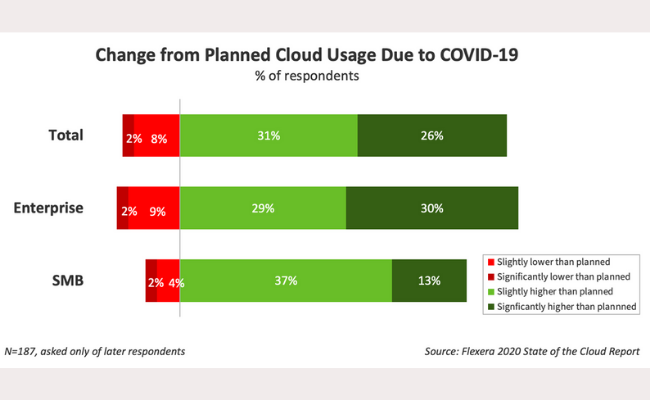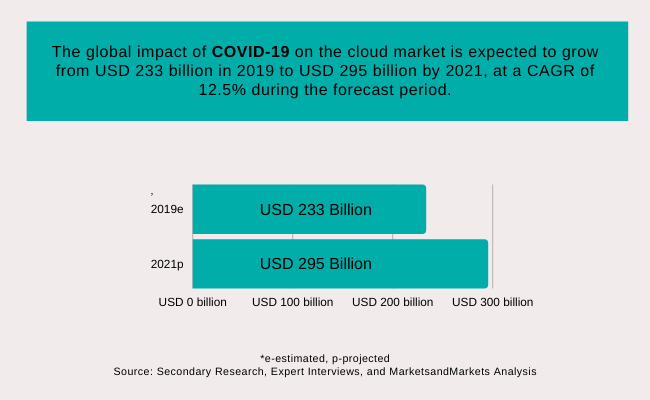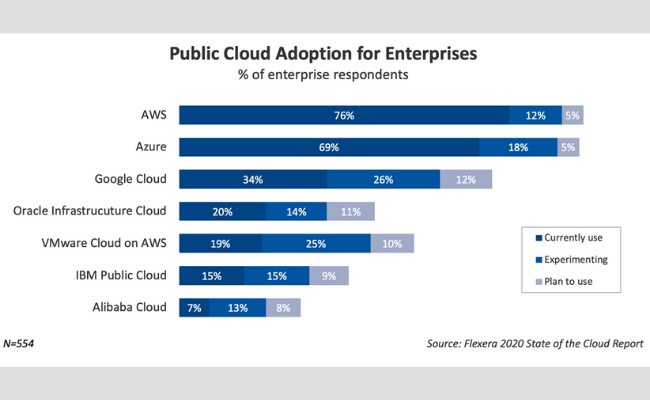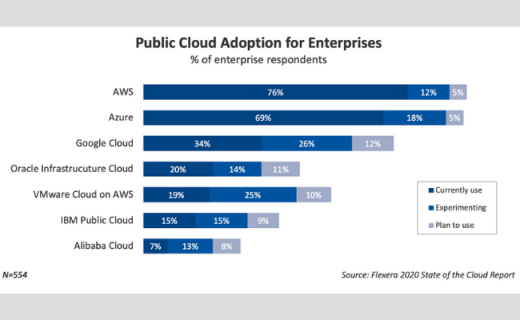Cloud Computing for Businesses: Will Covid-19 Surge Cloud Adoption?
Cloud Computing for Businesses: Will Covid-19 Surge Cloud Adoption?

A wise man once said not to let a good crisis go to waste. The Covid-19 has shaken the world upside down, many businesses experienced heavy losses while the others started to rise. The pandemic not only changed the way businesses operate but also the way they managed to survive.
Globally, the education system became online, doctors examined their patients over the Internet, and the corporate professionals worked from their home delivering their productivity; the world, in a way, started connecting virtually more than ever before.
But this global crisis came out to be the cloud having a silver lining for the cloud computing market. The cloud has not only been a boon for the businesses but also for the consumers to cope with the struggles of effective work management, entertainment, collaborations, and much more.
This article will throw a light on the cloud computing adoption by businesses and its future scope in the Covid-19 era.
But, what makes enterprises adopt Cloud Computing?
Cloud computing offers huge benefits to the businesses for expanding their business capabilities such as:
- Pay-as-you-go
- Scalability and flexibility
- Minimize capital investment
- Higher service quality
- Secure collaborations
- Safety, security, and compliance with regulations
These factors help the businesses build the resiliency to navigate during the crises.
How Pandemic drives Cloud Computing adoption?
In the phase of unprecedented disruption, as consumers, we all witnessed how we gave a tough fight against social distancing practices with the accelerated use of Netflix, Zoom, Twitter, and Slack – the Amazon Web services (AWS) public cloud-hosted services.
From the market perspective, many businesses are actively adopting cloud computing services to seamlessly manage their operations remotely by creating virtual workspace, managing workforce, storing crucial healthcare data, handling accounting and taxation, and supporting digitizing the manual processes.
A Flexera study indicated the increased use of cloud computing resources during pandemic among enterprises and small and medium-sized businesses. Out of the 57% of the respondents, 31% shows a slightly higher usage than they planned, and 26% shows a significantly higher usage than planned.

Image source: Flexera
Opportunities in the impact of Covid-19 on the Cloud Computing
Microsoft CEO, Satya Nadela, recently said that the impact of Covid-19 was such that just in two months of its 3rd quarter, Microsoft has seen the two years’ worth of digital transformation. With a “big bang approach”, he referred to the quick adoption by deploying the cloud services fast.
According to a study, The expected cloud market size in 2019 is to rise from USD 233 billion to USD 295 billion by 2021, at a Compound Annual Growth Rate (CAGR) of 12.5% during the predicted time frame.”

-
The surge of sales in the eCommerce sector
Taking into consideration the eCommerce space, with the rising number of Covid-19 cases after unlocking in many countries, merchants have observed a huge shift in consumer habits. Shopping from brick-and-mortar stores while maintaining social distancing is causing unprecedented levels of disruption for buyers which has encouraged them to shift their gears to shop online.
As of May 31, 27 percent of the US respondents said that they purchased hygiene products online instead of offline.
The increase in the number of online shoppers during the Covid-19 times has caused a ton of light bulb moments for the retailers globally to migrate their businesses to online platforms. Besides, the existing eCommerce store owners have been nudged to escalate their eCommerce game by adopting advanced technologies to increase their sales in 2020, for better customer satisfaction and timely product deliveries.
Adopting cloud computing helps merchants easily upscale or downscale their business. It not only helps merchants to reduce the costs of goods and services but also enables new companies to grow. At the consumer end, the cloud provides ease of shopping experience, anytime and anywhere delivery, cashless digital payments, and much more.
The pace with which eCommerce sales is booming during the Covid-19 times, it is sure that they will outperform post-Covid and, thus, lead to an increase in cloud market growth.
-
Cloud adoption among enterprises
Many enterprises (organizations with a number of employees more than 1000) are choosing the lane of cloud computing technology due to its multiple advantages.
In a survey of 750 respondents who were asked to share their insights into what drove them to move their organization to the cloud-based platforms, 73% of the respondents said cost-effectiveness is the main reason for their adoption. And, 61% of the respondents said migrating more workloads to the cloud was the main reason for their cloud adoption.
Public cloud is the most popular cloud option used by enterprises with a usage share greater than 61%. Talking about the public cloud providers for the enterprises, the order of dominance is Amazon, Microsoft, and Google over the rivals Alibaba Cloud, IBM Cloud, and Oracle Cloud. Amazon Web Services hold the first place with an adoption rate of 76% followed by Microsoft Azure with an adoption rate of 69%, and Google Cloud is the third place holder with 34%.
The statistics below depicts the order of public cloud service providers adopted by enterprises till now in 2020.

Image source: Flexera
The cloud adoption rate by enterprises in 2020 is expected to grow more as compared to the last year. Based on the existing trends, 59 percent of enterprises expect cloud technology usage to exceed prior plans due to Covid-19.
-
The rise in the video-streaming services
An estimate shows that this year in the U.S., the average time consumed with subscription OTT video content will exceed 62 minutes per day which is 23.0% up from 2019. With Netflix gaining the first position, the average time spent will exceed 30 minutes per day in the US in 2020, which is up more than 16% from 2019.
With most of the people staying at home, the exponential escalation in the video-streaming services has resulted in expanding the cloud market.
-
Transition to Work from home culture
Many IT and ITES companies are planning to opt the long-term work from home options. For instance, Twitter has announced a permanent work from home opportunity for its employees.
Based on the current scenario, the need for seamless collaborations over the Internet calls for strong cloud infrastructure has risen. The increase in the usage of SaaS solutions to support the remote workforce contributes to market growth as well.
Not only the IT companies, but the finance industry has also accelerated taking the route of SaaS-based cloud accounting solutions.
-
Inclination of Small business towards cloud
Many small businesses have shown interest in cloud adoption. Their major workload runs in public clouds (43%) as compared to the private cloud (35%) with AWS as the preferred public cloud.
In Covid-19 times, the cost-effectiveness and the data security that cloud provides without hiring the trained staff, it is becoming the need of the hour for many small business entrepreneurs.
-
Preferred choice of the Government sector
According to Gartner, 50% of US organizations are actively using the cloud. Both the private and the public cloud are being adopted by the government bodies with the public cloud services growing in double-digits.
And, through 2021, the spending forecast will grow on an average of 17.1%. The government bodies find effective cost savings and delivery services are the key drivers of cloud adoption in government.
-
Rise of cloud adoption in the Fintech industry
Like many businesses experiencing economic slowdown, the fintech industry has experienced the fiscal shocks and stock market slumps during the global crises.
Where everything came to a halt for some time, the finance industry changed the game at global level. They accelerated cloud adoption by providing the customers with branch-less banking, increased digital payment apps, and contactless payments via mobile phones to reduce social contact.
-
A changing trend in Bookkeeping
Bookkeeping has evolved with the changing technology trends. The traditional software is being taken over by cloud technology. With the pandemic, where work from home is the new fashion of working, many bookkeepers are now using cloud-based accounting software.
While many businesses were upended, shifting to cloud-based software has been quite a relief for the bookkeepers to save their employment and their employer’s business. Many bookkeeping apps are available which helps businesses eave an impact on their clients. The need to continue business operations has pushed entrepreneurs to opt for cloud technology.
Regardless of which time zone they are in, the cloud culture has enabled the accountants, managers, and bookkeepers to monitor their business’s financial health, providing ease of work collaboration and anytime or anywhere data access with enhanced security.
-
Cloud Adoption in Tax industry
Many companies are opting for cloud-based tax compliance solutions amidst Covid-19 situations. Both small businesses and big enterprises are considering choosing the digital approach for they provide the benefits of risk mitigation and flexibility.
Since, the Covid-19 occurred in the season of tax filing and returns in many countries, the tax professionals around the globe are pushed to pick cloud-based solutions for providing effective tax solutions to their clients. This approach not only enables the tax filing process faster but also allows the tax professionals to meet client’s needs in a cost-effective and the most reliable way.
The professionals are getting inclined to making a switch towards cloud-based tax software that post Covid-19 this trend will keep growing.
-
Paradigm shift of the Education Industry
As per a study, it is expected that the growth in cloud computing in the education market will be observed from USD 8.13 billion in 2016 to USD 25.36 billion in 2021. And, the compound annual growth rate expected is 25.6%.
But with the pandemic, the speed of adoption seems to increase from the expected rate. With unexpected lockdowns, the educational organizations experienced a complete shutdown, including schools, colleges, and universities, in many world sections.
The education however didn’t come to a halt, kudos to the man-made cloud technology. Though major universities are already running on cloud models for offering innovative eLearning experience, the pandemic forced many school-going students to go for their academics via online platforms which led to the expansion of the cloud market. Many higher education providing organizations are investing in cloud computing services to fulfill their need of a centralized system for academic process management.
Cloud computing has proved to be a boon for the educational institutions to bring everyone onto a virtually connected campus, transforming the learning process. Supporting the concept of ‘learning beyond classrooms,’ cloud computing vendors are sure to continue growing post-Covid-19.
-
Effective tool in Healthcare industry
The Healthcare industry has faced maximum challenges in 2020. With the number of Coronavirus patients increasing day by day, the generated data has increased more than before. Likewise, gathering the patient data, managing it, and storing it securely comes up as a big challenge for healthcare professionals. But, cloud computing has proved as the savior for the healthcare industry.
Cloud computing has provided immense benefits that have helped health care professionals continue providing their services remotely in a safe manner, even in pandemic times. The seamless collaboration of the cloud helps health professionals easily share the patient data with other healthcare providers, enabling them to provide them better services.
Besides, the adoption of technology by the healthcare industry, the increase of digitization, and the rising GDP helps in the modernization of healthcare services have added to the cause of the market growth.
Currently, North America tops the list of healthcare cloud market due to the presence of a huge patient population and major medical and technical companies. With more organizations opting for cloud culture globally during the Covid-19 crises, the healthcare cloud market is sure to boom at a great pace. And, Cloud computing, along with AI and machine learning is bringing the smart hospitals into existence.
In a nutshell, Covid-19 has been a catalyst to increase the space of cloud adoption opportunities in each industry bringing in the Digital Transformation by storm.
Main Challenges in Cloud Adoption
Like any technology adoption, the cloud computing implementation comes up with a prominent set of risks and challenges which include:
- Cloud Cost Management – Adopting cloud computing culture for business is undoubtedly the best move but meeting the business’s tailored needs can be expensive.
- Lack of expertise –Another hindrance to employee skill gaps comes while adapting to the cloud.
- Cloud Migration – Migrating the applications on the cloud can be difficult. According to a survey conducted by Velostrata over 95% of companies are making migration to the cloud, and more than half of them find it more difficult than the expectation.
- Cloud Security – Storing sensitive business information can be the biggest challenge. That is why it is necessary to check compliance and security laws while hiring.
It is quintessential to have a trusted cloud hosting provider who can help you provide quick, reliable, and cost-effective solutions for successful cloud operations.
Final Thoughts on Cloud Computing Adoption
Now, if you ask, should you go for a cloud computing approach? The answer is ‘Yes’ as it has been successful in providing benefits of flexibility (37%), Disaster recovery (38%), and relieving IT staff’s job (36%).
With a huge number of businesses, including small businesses, enterprises, fintech industry, entertainment industry, education industry, etc. transitioning to the cloud computing models to provide enhanced and unified user experience, the global adoption rate is undoubtedly increasing compared to previous years.
In 2019, the US gained the top position by spending $ 124.6 billion preceded by China investing $ 10.5 billion, the UK spending $ 10 billion, Germany spending $ 9.5 billion and Japan spending $ 7.4 billion.
In 2020, the global crisis has further added fuel to the cloud adoption fire, making the investors spend more in the market. For example, China-based Alibaba Cloud, Hangzhou, which is the top cloud provider in Asia, has declared $ 28 billion of investment in its cloud infrastructure over the next 3 years.
Converting the crisis into opportunities, adopting cloud computing strategies to cope up with the challenges, this Covid-19 has definitely created a surge in cloud adoption globally.
The post Cloud Computing for Businesses: Will Covid-19 Surge Cloud Adoption? appeared first on ReadWrite.
(40)


